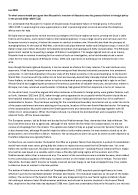How far do you agree that Mussolinis foreign policy in the Years 1933-41 was a complete failure?
How far do you agree that Mussolini’s foreign policy in the Years 1933-41 was a complete failure?
In 1925, Mussolini said that he wanted Italy to be “Great, Feared and respected.” As time went on, he took on many ventures to try and secure this. Despite this, his main ideal was to be a “Modern Julius Caesar” a leader who would be loved by his people and be successful in the countries eyes. Looking at way Mussolini carried out his foreign policy up to 1941, it was a failure. This came as a result of ill thought out ventures on top of weak resources and strength.
Italy’s greatest foreign policy success was the invasion of Abyssinia in 1936. Italy sent 500,000 men to a place that had once defeated them in 1896 and come out successful. On the other hand Mussolini was breaking UN regulations by using harmful mustard gas on towns and villages. The win was widely regarded in Italy as Mussolini’s greatest success and the start of Italy’s new Roman Empire. It could be argued that the sanctions imposed on Italy as a result of this could class it as a foreign policy failure, but the main sanctions Italy faced were only to do with arms and other weapons. Oil and Coal were still available as well as the British continuing to let them use the Suez Canal for trade. We can see from this that even though this venture was not a complete success, it did gain him a lot of prestige domestically as a result of well placed propaganda. Despite this, using chemical weapons was widely seen as a war crime, and generated a lot of hate for Mussolini within the UN. Despite this it was not a complete failure as trade agreements were upheld and there continued to be friendly Italo-European relationships post the invasion suggesting that Mussolini achieved everything he wanted to as a result of the Abyssinian capture meaning his foreign policy was largely successful at some points and can widely be regarded as not a complete failure.








